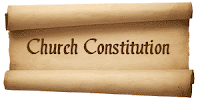 There are few aspects of church life that seem to produce more aggravation, conflict, and institutional paralysis than the Church Constitution. I’ve waded my way through many of them over my years in ministry. The typical church constitution and by-laws is a train wreck of clumsy language, inexplicable rules, and outdated structures. When I read a church constitution, like an archeologist digging through the relics of the past, I can spot the old bones of previous church conflicts in which the church tried to legislate peace and harmony rather than doing the high and holy work of becoming “one in spirit and purpose” (as Paul says in Philippians 2). And most of the rules are designed to prevent problems rather than accomplish a transforming mission.
There are few aspects of church life that seem to produce more aggravation, conflict, and institutional paralysis than the Church Constitution. I’ve waded my way through many of them over my years in ministry. The typical church constitution and by-laws is a train wreck of clumsy language, inexplicable rules, and outdated structures. When I read a church constitution, like an archeologist digging through the relics of the past, I can spot the old bones of previous church conflicts in which the church tried to legislate peace and harmony rather than doing the high and holy work of becoming “one in spirit and purpose” (as Paul says in Philippians 2). And most of the rules are designed to prevent problems rather than accomplish a transforming mission. I know some of us feel as if we'd like to chuck these extra man-made documents and just stick with the Bible, but there aren't any Scripture verses that tell us who is supposed to order the Bible study books and turn on the heat for Wednesday night activities.
I know some of us feel as if we'd like to chuck these extra man-made documents and just stick with the Bible, but there aren't any Scripture verses that tell us who is supposed to order the Bible study books and turn on the heat for Wednesday night activities.Here at First Baptist in Wallace, it’s time to do a complete overhaul of our church’s Constitution and By-Laws. We need a much simpler, more open structure that makes it clear what we’re trying to accomplish together, and how we plan to get there.
I believe that, before we list any officers, committees, or procedures, our constitution should contain a declaration of what values we want our organizational structure to champion. Here’s my list of church-transforming values:
We value accomplishing God’s mission:
Our guiding documents should explain how each officer, team, committee, and program is expected to help us accomplish our shared mission. If we can’t find a connection between that group and our mission, then that position or committee is a waste of our people’s energy, time, and God’s gifts, and it ought to be eliminated.
We value trust and openness:
Let’s select leaders whom we trust and respect, then set them free to make decisions under the leadership of the Holy Spirit. Rather than requiring them to seek various levels of approval, rather than failing to trust them in how they use their budgets, we should only require that they keep us informed on how they are accomplishing their part of our shared mission. And let's have leadership processes that are open and clear to everyone - no insider secrets, loopholes, and hidden processes.
We value accountability:
Every leader and team in the church exists to serve, not to rule. As servants within the body, we need to be accountable to the body. Teachers must effectively teach. Deacons must faithfully minister. Teams must accomplish their indispensable part of the mission. So there should be very clear points within each position of responsibility at which those leaders and teams demonstrate that they are faithfully handling their part of our shared mission. Servants need to know there is a time and a place to show what they've done with the Master’s entrusted talents.
We value growing new leaders:
Some churches have a very stagnant leadership structure. Year after year, the same people control the same key parts of the church’s leadership structure, perpetuating the same perspectives. Even in a rotating structure, they take their year off, and then end up right back in the same committee as the returning chairperson. This stifles creativity, shuts out potential new leaders, and creates an unhealthy dependency.
Once we lay this foundation of values, then we'll know better how each leader and team should function in order to see these values lived out in the functioning of our part of Christ's body, the Church.
Do you have some foundational values that you think should shape and guide our structure? Share them!







